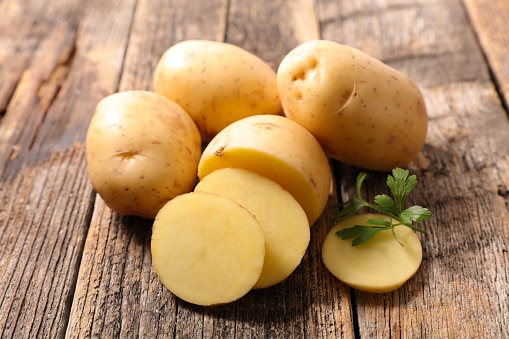Can Diabetics Eat Potatoes? – Overview
Potato, also known as Solanum tuberosum; is a nightshade perennial vine used for its starchy nutritious tubers. The potato is a staple food that originated in the Bolivian Mountains.
Potato is usually eaten whole or mashed as a cooked vegetable, and they are also processed into potato flour, which is used in bakery and sauces thickening.
Vitamin C, proteins, and other vitamins are all found in extremely nutritious potatoes.
The potato is one of the well-known root plants available throughout the year and is among the most popular types of food that are diverse in color and taste.
The potato is included in the carbohydrate group, and that’s what might keep some away from them. But even so, the benefits of potatoes are many, especially as a source of energy.
What are the Health Benefits of Potatoes?
Bone Protection. The potato contains many nutrients that are essential and beneficial to bone health, such as iron, phosphorus, and calcium, which means that eating them helps protect the bones and promote their health.
In contrast, iron and zinc play a major role in the manufacture of collagen, which is important for maintaining bone hardness.
Promotion of heart health. One of the benefits of potato is that they contain dietary fiber, potassium, vitamin C, and vitamin B6, all of which promote heart health and protect it from various diseases.
These ingredients and nutrients control blood cholesterol levels, thereby reducing the risk of heart disease.
Reducing cancer risk. One of the most important benefits of potatoes is that they reduce cancer risk by containing folic acid, which plays an important role in repairing damaged DNA in the body and preventing cancer cells from spreading.
The antioxidants found in potatoes also reduce free radical levels in the body, which contributes to raising the risk of developing different cancers.
Weight Loss. Although this benefit is associated with eating potatoes, it relies on its cooking method, roasting help, while frying can cause weight gain.
Potatoes contain dietary fibers that help to feel full for a longer period, reducing the number of calories taken later during the day.
Control blood pressure. Potassium helps expand blood vessels and keep them relaxed, which will positively reflect blood pressure levels.
Potassium can be found in potatoes, but getting this benefit from this kind of vegetable is in choosing a healthy cooking method.
Other Benefits of Potato
There are other benefits related to potatoes, which include:
- Reduce the risk of infections.
- Protection against constipation.
- Enhancing the digestion process in the body.
- It’s good for the skin.
- Reduction in the period of cold disease
What is the Nutritional Content of Potatoes?
Potatoes are full of vitamins and minerals, although the method of preparation can affect the nutritional content, the nutritional value of 100g of potatoes is as follows:
| Content | Amount |
|---|---|
| Calories | 77 |
| Total Fat | 0.1 g |
| Saturated Fat | 0 g |
| Cholesterol | 0 mg |
| Sodium | 6 mg |
| Potassium | 421 mg |
| Total Carbohydrate | 17 g |
| Dietary Fiber | 2.2 g |
| Sugar | 0.8 g |
| Total Protein | 2.9 g |
| Vitamin C | 19.7 mg |
| Calcium | 12 mg |
| Iron | 0.8 mg |
| Vitamin D | 0 IU |
| Vitamin B6 | 0.3 mg |
| VitaminB12 | 0 mcg |
| Magnesium | 23 mg |
Can Diabetics Eat Potatoes?
We can say that diabetics don’t have to avoid eating potatoes altogether, but care must be taken to make them small and not eat them in too large quantities.
The nutritionist or health care provider can be used to learn how much carbohydrate is present in regular meals, and how to calculate the proportion of carbohydrates that can be taken to maintain blood sugar levels and depending on the patient’s medication.
There is a need to know how much potatoes diabetic patients can eat, depending on the type of diabetes a patient has and the drugs it takes to keep blood sugar levels within the normal limit.
What is the best way to eat potatoes?
To obtain the benefits of potatoes, they have to be handled properly.
Fresh potatoes: They can be pure, or squeezed and added to different drinks.
Boiled potatoes: potatoes are climbed and eaten, preferably with no salt to be healthier.
Fries must be kept as far away from them as possible. The proportion of oils they are attached to can cause serious health damage.
See Also
What kinds of bread can a diabetic eat?
Is Artichoke Good for Diabetics
Is Cauliflower Good for Diabetes
References
https://www.britannica.com/plant/potato
https://www.ncbi.nlm.nih.gov/pmc/articles/PMC4764041/

As a nutritionist, I research, find and experiment with recipes, natural diets and meal plans for weight loss, bodybuilding, and detoxing.
